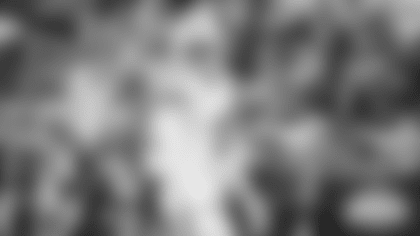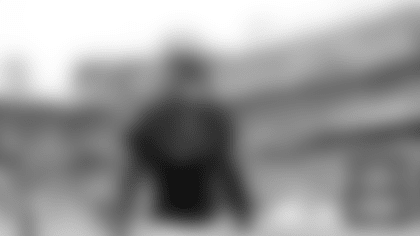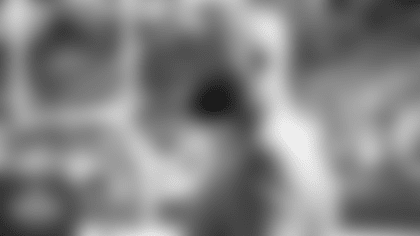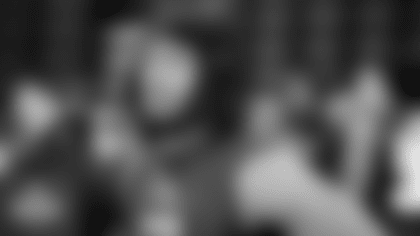The 49ers agreed to terms last night with Jimmy Raye. Due to differences in location, he hasn't signed the official documentation, but will do so upon his return to 49ers headquarters next week. In the meantime, Coach Raye spoke to the media on a conference call today. Read Raye's transcript below.
RE: Congratulations Coach.
"Thank you, thank you."
RE: Where are you calling from?
"I'm sitting in about 12 inches of snow in Morristown, New Jersey."
RE: Tell me how you hit it off with Coach Singletary? What were the things that he was emphasizing and how does that mesh with what you try to do offensively?
"Well, I think one, the first common denominator was the vision that he shared and the passion that he has football was mutual. We had a shared vision of how you play the game and what he would like to see when the game is played and his passion for football was kind of contagious and along kind of the same thoughts that I have about the game, and that started our mutual understanding between the two of us and from there we moved forward."
RE: Mike mentioned just now when we had him on the conference call, the word conviction several times in talking about you and what you expressed to him. What is your offensive vision and how did you express it with such conviction?
"Well, I think basically what we had a shared experience about was the fact that the team's that I've been the leader of as a coordinator have been tough physical football teams that run the ball and have a physicality about them, but play an offense that takes care of the contingencies of the defense. But the overriding factor is that we want to be tough-minded, physically and emotionally, and I think those were the things that he was excited about."
RE: When did you first have contact with Coach Singletary about this opportunity?
"I think it my first meeting with him was I walked across the field the day we were out there to play them, during the regular season. I walked across the field and introduced myself to him when he was on the boundary. That was my first contact with him and we talked for the first time on the phone after the conclusion of the season. I think I was gone home to North Carolina. I was down for the divisional weekend of the playoff games and I had a conversation with him on the phone."
RE: Jimmy, you signed a three-year contract, is that correct?
"Yeah, something like that."
RE: Do you see yourself serving out all three seasons?
"You know something I don't know?"
RE: No I don't.
"I intend to fulfill the services of the contract. Yeah, I hope we stay there and get this team in the playoffs and in the winning mode and I hope to be there through this contract and maybe longer."
RE: Obviously, the success of a coordinator is in large part due to the players he has on the field running his plays. How do you feel about the talent that you are going to be inheriting with the 49ers?
"At this point, I had a little bit more feel for them defensively because the preparation that we had prior to playing them. I intend, when I get back there, I know some of the offensive components, but I don't…I haven't studied the offensive side of the ball and I plan when I get back to grade the first six weeks of the season, look at the middle six and grade the last six weeks of the season in order to get my own evaluation of where I think the personnel is. I know some of the people, I like the runner. I know of him and what he has done, [Frank] Gore and the backup runner DeShaun Foster when he was at Carolina. The tight end, I watched at the Combine, Vernon Davis. I like his size and speed and ability to block at the point on the line of scrimmage. The quarterback Shaun Hill I only saw that day that he took us apart when we played out there. Isaac Bruce I know and the center I like a lot. But I'm in the process of evaluating the personnel so I have a better feel for the people myself."
RE: Do you plan at some point, or have you already started talking to some of those players or reaching out to them over the phone?
"No, I haven't. I was there for maybe 12 or 14 hours. I got in, I was into San Francisco late in the evening, got in there, went to bed. I got there like 2:30 Eastern Time. Got up, had a meeting at seven o'clock in the morning the next day and back on the plane back to the east coast, at four o'clock the next day. I haven't had an opportunity to reach out. That process will begin when I get back there on Wednesday."
RE: And when you come back Wednesday, will you be here for the long haul?
"Yes, I will be there meeting with Scot McCloughan and getting the personnel evaluation from our personnel department as I start to evaluate the tape along with the rest of the staff because I'm going to be in a position where some of the people there, the coaches there, who know what they were asked to do. It will be easier to evaluate them because I don't know what they were asked to do as I'm watching the tape, but physically I can see what they are capable of. But, I'll have the advantage of the staff in place there that know what they were asked to do."
RE: Is there anybody currently on the 49ers staff that you've worked with in the past?
"No, there isn't. I know through professional association, I know Jerry Sullivan and Chris Foerster. I know Tom Rathman as a player, but I haven't worked with him and I know of Pete [Hoener] the tight ends coach, but I haven't worked with any of those people."
RE: Will you bring in any people close to you as assistants?
"Well, me and Mike are going to talk about that. Right now, the staff is pretty much set the way it is and we'll be having on-going discussions when I get back to San Francisco."
RE: Jimmy, there's some thought that Mike has such specific ideas about what he wants to do on offense and also the fact that much of the staff is in place, that it might not have been as attractive of a job for some of the candidates, that he made contact with and I'm just wondering if you can address that? Maybe Mike has a very specific view that doesn't allow for a lot of creativity.
"Well, I think and I followed this as the interview process was going on, I think some of that has been overstated. He is the head coach of the football team and his influence offensively will be his because ultimately it is on his watch, but I think it would be unfair, at least in my assessment in my time that I spent in the times we have talked, about his vision of what he would like to see offensively. I would be reluctant to pigeon hole it as a one dimensional box type operation. Maybe some other people in the interview process didn't feel that there was enough flexibility, I didn't get that sense from my time spent there or of talking to him, so I would be reluctant to say …that it was appealing to me and hits my mind's eye good and that's the only person that I can speak for."
RE: What is your view on the passing game? I mean there has been so much talk about his conception of the emphasis on running? What is your view on flinging the ball and the forward pass?
"Well, I think this is the new millennium, this is 2009 and there is a Wildcat thing going on and there is a down the field thing going on. I don't think you can play one dimensional, never have. I mean we were really good in Kansas City, an outstanding run action, play action off of our running game there and got the ball very successfully to Tony Gonzalez when we were there. We threw it to the wide receivers Andre Rison and Derrick Alexander. I don't think…I have no objection to throwing the football. I think if people are going to try to load up the box against you in the running game, depending on your personnel groups and location and the passes available to you, we will play, we will throw the ball, we will play offense and our offense will be able to take care of the contingencies of what the defense presents."
RE: Do you run the digit system?
"Yes, I do."
RE: Can you talk about that? Who do you consider your influences when it comes to that?
"I started under Ernie Zampese, just as Norv [Turner] did. The Don Coryell System, the three-digit pass system. My first introduction to it was when I was offensive coordinator with the Rams under Ernie Zampese and that influence. I've cemented my own ideas into that, but that's basically the first of it of where my introduction to it came. We had Jim Everett at the Rams and Ernie came up from Coryell at San Diego with the three digit system and then I went with Atlanta with Rod Dowhower and the three-digit system. Really, the system, well, the three-digit system, or the west coast system of whatever you refer to it, the nomenclature of how you call in an active play is really just a functional operation of how you operate offensively."
RE: How would your system in the digital system be similar to Mike Martz's? Is there any comparison there?
"I don't know Mike Martz's system. I know Mike was with Ernie for awhile, but I don't pretend to know. Everybody takes a part of what they are exposed to and then expands it to where they go. I would be remiss to sit here and compare what we do and what I know to what Mike Martz does because I don't know what exactly what he does. I know he had great success in St. Louis with the Greatest Show on Turf and I'm sure it's a hybrid of Zampese and Norv Turner because that's what he, like I started, but I would be reluctant to say that they would be similar or dissimilar at this point."
RE: Jimmy, at a certain point in your career, were you or are you still be interested in becoming a head coach in the league?
"Well, my main objective right now is to get this football team operating offensively, the San Francisco 49ers to its maximum ability and see if we can get in the playoffs. Of my individual aspirations are second to what my intentions are as I start this quest with Coach Singletary and the 49ers."
RE: Jimmy, your record, you started off as a professional coach, an assistant coach with the 49ers in 1977. What do you remember about that team, that era?
"Yeah, you dated me. I started back in the 14 game scheduled season and the six exhibition games and I've come full circle back to the 49ers. When I was at the 49ers, Gene Washington, Cleveland Elam and Cedrick Hardman and that great defensive rush front that we had there at the 49ers. Gene Washington, Delvin Williams the running back and Mel Phillips, I mean that was a different time I was there in the transition time when the Morabito widows sold the football team to the DeBartolo's and I was only there the one year and then I followed Monte Clark on back to Detroit."
RE: Was there ever a point that you thought after 2005 that you might never get another chance to be an offensive coordinator in the league?
"No, I didn't concern myself with that really. What you have to understand is I started in an era where there were only six coaches and there were no titles. I mean, everybody, you coached. So the responsibilities that you had as an assistant coach, they glorified it some now to make the money justifiable by giving titles but I didn't think of it any different or worried about a title in terms of what I did productively coach. I was never looking for the next opportunity to go run and say, 'Okay I'm an offensive coordinator.' I've been there, done that. So coaching to me, regardless of the title, I've been productive and created Pro Bowl players at the positions I've coached ongoing since then. I've never really concerned myself with trying to become a coordinator again. To me there's two separations: there's the head coach and there are the assistant coaches. Someone has to be a leader on each side of the ball and so with that comes the new terms that they have, but I came from the earlier part of it so it doesn't bother me that I didn't have a title as offensive coordinator. I've had the title of senior offensive assistant, where I coached the coaches on the staff. I've been assistant head coach, which is just a title, but in order to maximize the monetary rewards, I was assistant head coach/senior offensive assistant. I've had a number of titles over the years, but at the end of the day, the bottom line is you're just an assistant coach trying to recreate or do what the head coach as the leader of the organization is trying to get done."
RE: When you were with Norv with the Raiders, how did you split up the play-calling? Was that all him or all you or a combination?
"It was a mismatch. That was one of the things I was alluding to: I had the title over there of assistant head coach/offensive coordinator. But the head coach was basically the offensive coordinator when you break it down in the due diligence of how it was functioning. Norv was the principal play-caller, I was the backup play-caller. He was head coach, but technically the offensive coordinator because he called the game. We game-planned the game as if I was going to call the game but at certain times that he said, 'Hey, Jimmy you take it.' I called the plays because I was prepared as the play-caller because that's the role that I was in. But the lion's share of the time that I was there, the lion's share of the play-calling was done by him."
**






